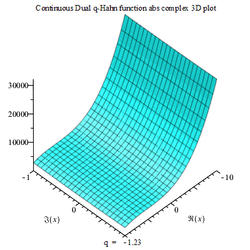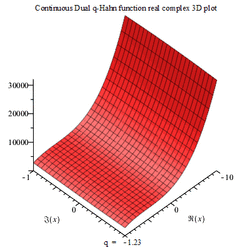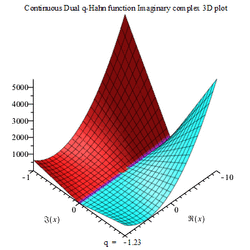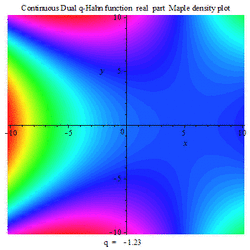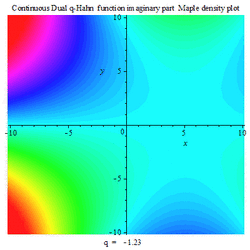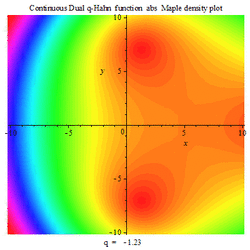Continuous dual q-Hahn polynomials
From HandWiki
In mathematics, the continuous dual q-Hahn polynomials are a family of basic hypergeometric orthogonal polynomials in the basic Askey scheme. Roelof Koekoek, Peter A. Lesky, and René F. Swarttouw (2010, 14) give a detailed list of their properties.
Definition
The polynomials are given in terms of basic hypergeometric functions and the q-Pochhammer symbol by [1]
- [math]\displaystyle{ p_n(x;a,b,c\mid q)=\frac{(ab,ac;q)_n}{a^n}{_3\phi_2}(q^{-n},ae^{i\theta},ae^{-i\theta}; ab, ac \mid q;q) }[/math]
In which [math]\displaystyle{ x=\cos(\theta) }[/math]
Gallery
References
- ↑ Mesuma Atakishiyeva, Natig Atakishieyev, A NON STANDARD GENERATING FUNCTION FOR CONTINUOUS DUAL Q-HAHN POLYNOMIALS, REVISTA DE MATEMATICA 2011 18(1):111-120
- Gasper, George; Rahman, Mizan (2004), Basic hypergeometric series, Encyclopedia of Mathematics and its Applications, 96 (2nd ed.), Cambridge University Press, ISBN 978-0-521-83357-8
- Koekoek, Roelof; Lesky, Peter A.; Swarttouw, René F. (2010), Hypergeometric orthogonal polynomials and their q-analogues, Springer Monographs in Mathematics, Berlin, New York: Springer-Verlag, doi:10.1007/978-3-642-05014-5, ISBN 978-3-642-05013-8
- Koornwinder, Tom H.; Wong, Roderick S. C.; Koekoek, Roelof; Swarttouw, René F. (2010), "Chapter 18: Orthogonal Polynomials", in Olver, Frank W. J.; Lozier, Daniel M.; Boisvert, Ronald F. et al., NIST Handbook of Mathematical Functions, Cambridge University Press, ISBN 978-0-521-19225-5, http://dlmf.nist.gov/18
 |
